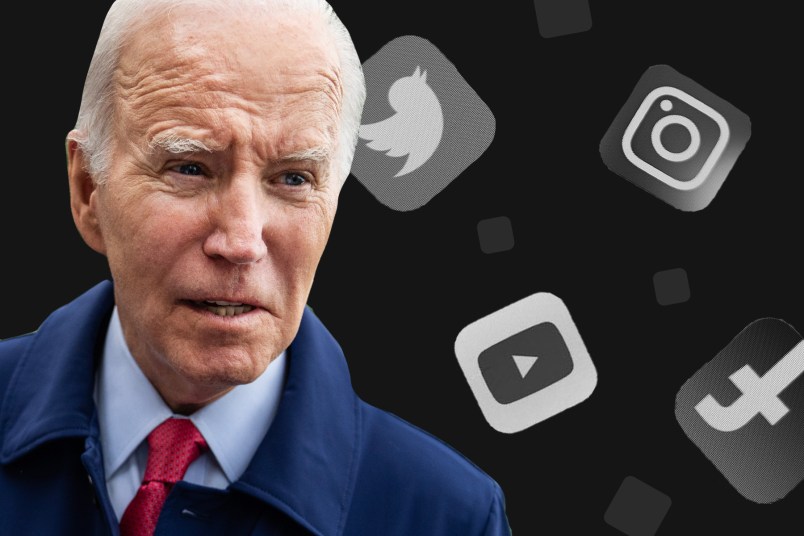A panel of judges Thursday invoked the mob in describing the federal government’s behavior and accused it of “strong-arming” social media companies, using “not-so-veiled threats” and holding “secret meetings.” The bizarre rhetoric came in oral arguments over a district court decision that barred wide swaths of the government from flagging misinformation to social media companies.
The lower-court decision, handed down by Donald Trump-appointed District Court judge Terry Doughty, was an exercise in right-wing punditry, as he called the government’s interactions with the companies perhaps “the most massive attack against free speech in United States’ history.” He added that during the pandemic, the government “assumed a role similar to an Orwellian ‘Ministry of Truth.’”
Much of the evidence mustered by the red state attorneys general who brought the case and seized on by Doughty consists of government officials flagging misinformation — mostly related to COVID-19 and vaccinations — and asking the tech companies to remove it.
The Fifth Circuit panel handling the arguments on appeal — featuring Judges Jennifer Elrod, Edith Brown Clement and Don Willett, all appointed by Republican presidents — sounded inclined to adopt Doughty’s perspective Thursday afternoon.
Elrod was in an extended back and forth with the Department of Justice’s Daniel Tenny about how explicitly threatening the government had to be in its communications with the social media when she made a comparison to the mob.
“I’m certainly not equating the federal government to this, but this is an analogy — probably an inapt analogy so if you’ll excuse me,” she began. “In these movies that we see with the mob or something — they don’t say and spell out things but they have these ongoing relationships. They never actually say ‘go do this or else you’re going to have this consequence’ but everybody just knows.”
“I’m certainly not equating the federal government with anybody in illegal, organized crime,” she added hastily. “But there are certain relationships that people know things without always saying the ‘or else.’”
Despite her handwashing, her colleague seemed on much the same page.
“Here you have government in secret, in private, out of the public eye, relying on, as Judge Elrod described, fairly unsubtle strong-arming and veiled or not-so-veiled threats,” Judge Willett followed up. “‘That’s a really nice social media platform you got there — it’d be a shame something were to happen to it.’”
Willett seemed to expand his definition of a threat even further later in the proceedings, after Tenny argued that many of the seemingly damaging quotes from government officials that Louisiana and Missouri cite were taken out of context.
“What about the President’s own comments — that social media platforms are ‘killing people,’” Willett rebutted. “No threat in that statement, but powerful nonetheless.”
Tenny began his response slowly.
“So the legal question, then, would be ‘is it proper for a district court to say the President can’t make powerful statements trying to persuade the public about what people should or should not do?’” he said.
Missouri Solicitor General John Sauer — who opened his remarks with a hypothetical in which the government directs book sellers to partner with it in an book burning program for tomes critical of the administration — approvingly referred back to some of the judges’ comments throughout the arguments.
“When the platforms make decisions, it has to be relieved from the boot of federal pressure and federal coercion that was going back to 2017 in this case, including threats, secret meetings, to Judge Willett’s point,” Sauer said.
The case will almost certainly be appealed to the Supreme Court, completing the circuit of right-wing, anti-administration lawsuits that has become ubiquitous: right-wing district court to ultra-conservative 5th Circuit to the 6-3 conservative majority Supreme Court.



